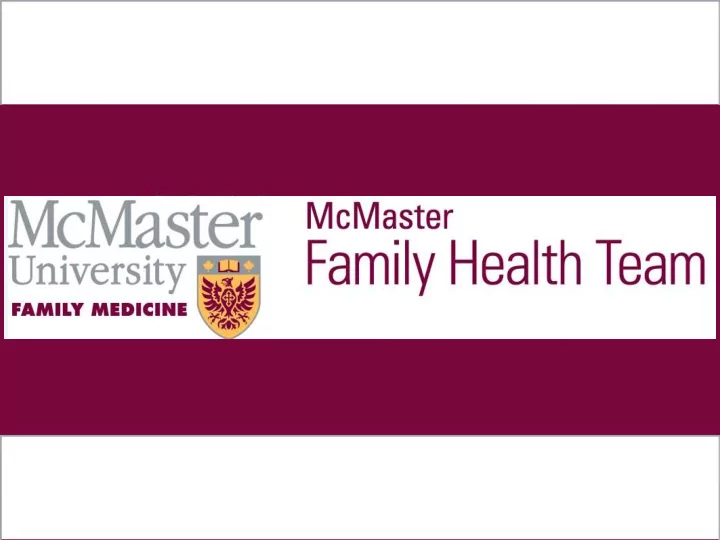

Ten Years of Anxiety Groups at McMaster Family Health Team What we have learned AFHTO 2014
How Did it Begin • Always listen to students • The referrals – the rationale
The First Group • Five sessions • About 8 referrals • The work to make it a part of a clinic culture
Publicity • Physicians • Word of mouth • Newsletter • Website • Mental health referrals
Contact with Patients • The letter • The phone call x2 • No prescreen interview • No back-to-back repeating of group
The Evolution of the Sessions • Where does Anxiety Come From? • Thinking and Relaxation 1 • Thinking and Relaxation 2 • How to Manage a Panic Attack • Self-Esteem • Communication Skills • Sleep, Diet and Exercise • Goal-Setting and the Tool Box
Safety in the First Session • Rank yourself of a scale of 1-10 in terms of anxiety • Group goals and norms • The power of the group • The right to pass • Closing • What interested you most in group tonight?
Methodology • Psycho educational • Cognitive Behavioural Therapy • Solution Focused Therapy • Relaxation strategies • Mindfulness exercises
Resources • Cognitive behavioural worksheets • The Big Bang Theory • Video 23 ½ hours • Anxiety and Phobia Workbook – Bourne • SMART goal setting
Hand Outs • Trial of giving out the hand outs as a book • Decision to give weekly hand outs • Use of meditation tapes • Use of the Big Bang Theory
Staff • Social Work • Occupational Therapy • Psychology
Participants • What to do about no shows • What to do if someone leaves a session • Attendance requirements • When is the group closed • Men/Women (two men’s only groups) • Teens in the adult group • Inclusion of seniors
Profile of Common Patients • People with anxiety, which is having a moderate impact on their life, but are able to continue functioning in their day-to-day lives • Individuals with severe social anxiety (individual work first and connection with leader, then involvement in group) • People with personality disorders • People off work due to exacerbation of anxiety symptoms
Challenges • Showering • Skin picking • Assuming literacy • Holidays and staff vacations • Significant majority of one gender • Teenagers • Talkers • Non-talkers
Group Outcome Interview Questions and Answers • Facilitators: Colleen O’Neill & Lynn Dykeman • Date: Fall 2013 • How did you find out about the group? • Doctor (x5) • Social Worker (x2) • Occupational Therapist (x2) • Newsletter
What Interested you in Coming to Group? • Doctor thought it was a good idea • Don’t want to be the way I am • Don’t want to go somewhere and have fear • Seen as alternative to meds • Curious to see if it works. It has worked remarkably well, surprised me. • Strategy to get through the work day • Off on leave, managing anxiety. Step to getting back to work.
What Were you Hoping to Learn? • No expectations • Looking for new strategies • Relaxation and coping techniques, specific strategies • Learn how to cope with changes in daily routines that are unpredictable • Thought medication was needed, but willing to try • Continued growth in ways to deal with stress
What Were you Hoping to Learn? (cont’d) • Concrete strategies/practical tools • Ways to live with “issues” • Reminder about previous learning and structure to apply • Modelling from others • Regain sense of control over life; gain understanding of what is happening • Hoping for answer to “why did it happen”/strategies to control
What can you do Now that you Couldn’t do Before? • Talk in front of people • Go to work • Go to the mall • Calm myself down • Cope – manage uncertainty • Able to say “no” • Boost self-esteem • Look at a different perspective
What can you do Now that you Couldn’t do Before? (cont’d) • Avoid “Stinking Thinking” • Don’t catastrophize, can shrug things off • Deal with stress • Identify triggers • Communicate with family better; awareness of others’ anxiety • Be kinder to self’ give myself credit • Talk to intimidating people without fear
What New Skills are you Using in your Life? • Box breathing (x7) • Relaxation (x7) • Breathing exercise (x7) • Challenging stinking thinking (e.g. distortions) • Reframing thoughts • Affirming self • Decreased caffeine • Goal-setting (x10) • Saying “no)
What Would you Tell Someone Interested in Coming to Group? • Come!!! • Nothing to lose • Variety of topics • Lots to learn • Will change your life • Peer support
What Would you Tell Someone Interested in Coming to Group? (cont’d) • Connection with others • Group dynamics • Very inclusive! • Validation of everyone • Equitable • Diverse people • You will notice the difference
What Session was the Most Interesting? • Understanding Anxiety • Thinking and Anxiety (session 3) • Self-Esteem • Progressive Muscle Relaxation (session 2) • Managing Panic Attacks (session 4)
What Session was the Most Boring? • Sleep, Diet and Exercise – common sense
What Would you add to the Group? • Incorporate strategies for how to do more exercise • Community resources for activity • Add in concrete strategies • Tip of the week
Programming that did not Work • Once a month drop-in sessions with multiple leaders • Having a monthly reunion session • Taking a break over Christmas
Current Anxiety Group Offerings • Anxiety treatment group – 8 structured sessions; one afternoon group and one evening group (differences in the group) • Teen Group – every other Monday from 4:00-5:30; drop-in, some structure • Managing Life Stress – Aftercare group; drop-in every second Tuesday; some structure, 1:00-2:30
Occasional Offerings • Social Anxiety Group • Obsessive Compulsive Disorders Group
Recommend
More recommend